Targeted promotion of young talent
– so that someone will still be researching rare diseases tomorrow
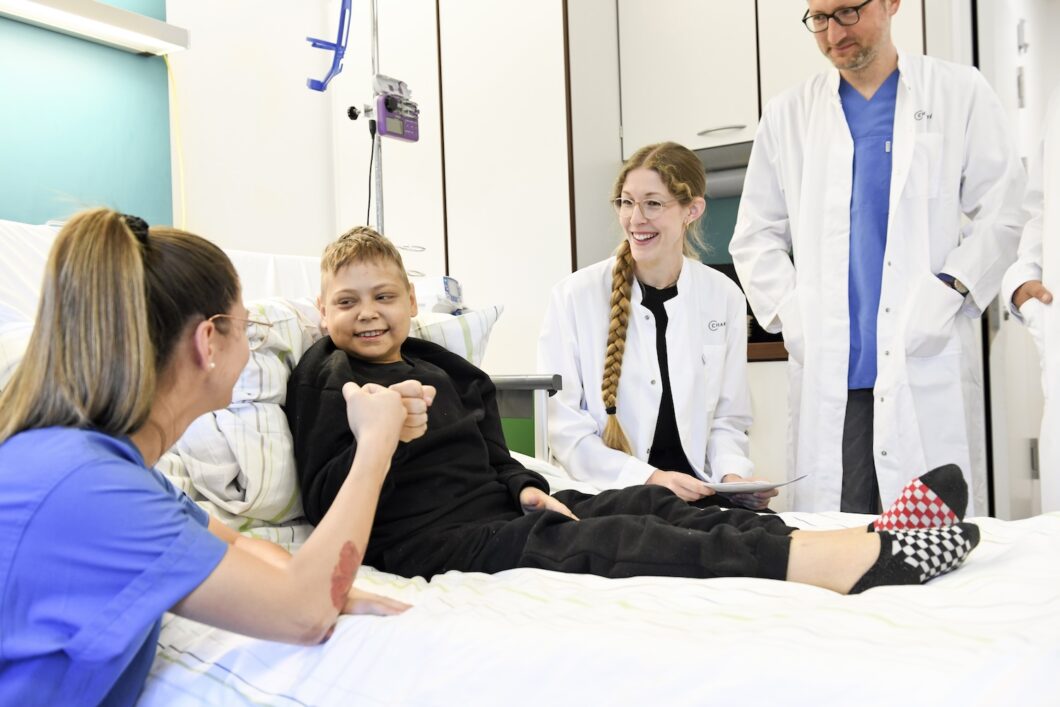
Clinician Scientists for Rare
– so that someone will still be researching rare diseases tomorrow
Since rare diseases affect children and adolescents in eight out of ten cases, not only patient care but also research into rare diseases is primarily a pediatric topic. However, there has long been a lack of third-party funding in pediatrics and adolescent medicine in particular, and therefore a lack of support and career prospects for young scientists. With your help, we want to change this.
Promoting young talent in pediatric research

The lack of young talent in pediatric research is evident today at all stages of the training and career path of (prospective) pediatricians in university medicine. This is a dramatic development for those affected by rare diseases. Pediatrics needs a real “reforestation program” for young scientists to ensure that there will still be someone researching rare diseases in the future and that children and adolescents can participate in medical progress.
This is why the promotion of scientific talent in pediatrics is a central objective of Alliance4Rare, a research initiative for children with rare diseases, which was launched in 2022 by the Eva Luise and Horst Köhler Foundation.
The Alliance4Rare sees itself as a link between the rapidly developing possibilities of modern medicine and the immense need for research into rare diseases. Through the trusting cooperation of supporting and researching partners, Alliance4Rare gives children and young people affected by rare diseases hope for a healthier future. Become a partner of the Alliance4Rare!
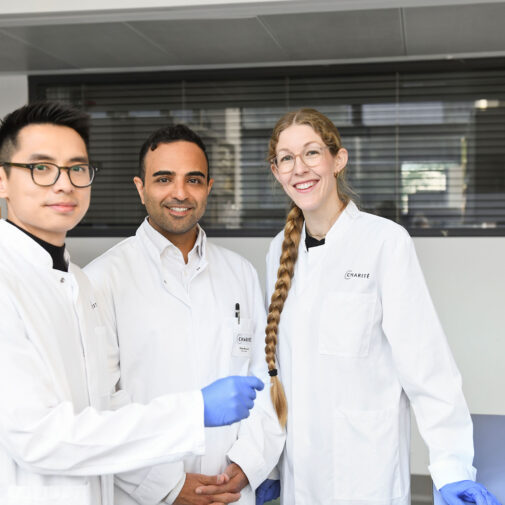
The Clinician Scientists for Rare Program
– a structured training and career path for pediatricians and human geneticists with strong research skills in university medicine
The funding focus of this research initiative is on further training and networking for (prospective) pediatricians and human geneticists who wish to become involved in the field of rare diseases on a long-term basis, both clinically and scientifically. In order to prepare researching pediatricians and human geneticists for their challenging task, the Alliance4Rare focuses on establishing a structured training and career path based on the recommendations of the German Research Foundation (DFG).
The Clinician Scientist for Rare program provides participating doctors with the necessary freedom for scientific work at a high level. Depending on their respective career stage, the fellows are released from their clinical duties by 25 – 50 %. During these protected research periods, they drive forward their scientific projects on particularly serious rare diseases and undergo intensive continuing education on specific topics and technologies. While the participants go through the local clinician scientist programs of their medical faculties, they receive the specific training and networking opportunities of the CS4Rare program on top:
Thanks to the commitment of the Alliance4Rare funding partners, young talents in the research field of rare diseases are for the first time offered structured further training and a reliable perspective that can also compete with strong research departments.
Concept and implementation of the program
Alliance4Rare gGmbH, a wholly owned subsidiary of the Eva Luise and Horst Köhler Foundation for People with Rare Diseases, acts as both sponsor of the Clinician Scientist for Rare program as well as a link between all of the local partners from university medicine. Alliance4Rare designs, coordinates and supports the entire training and networking program and is available to all participants as a point of contact. In cooperation with the University Children’s Hospitals, the funding bodies and the Alliance4Rare Scientific Advisory Board, Alliance4Rare coordinates and supports the tendering and review process and handles the entire third-party funding management.
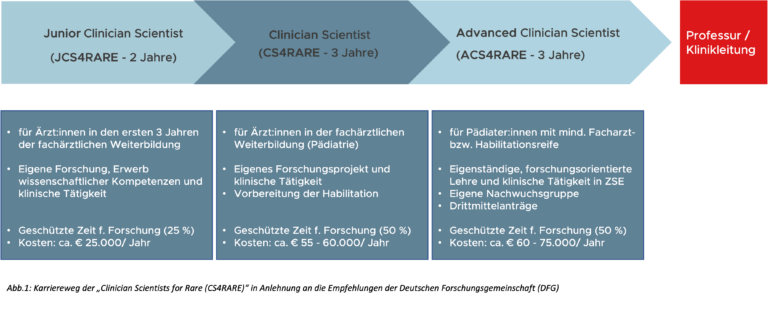
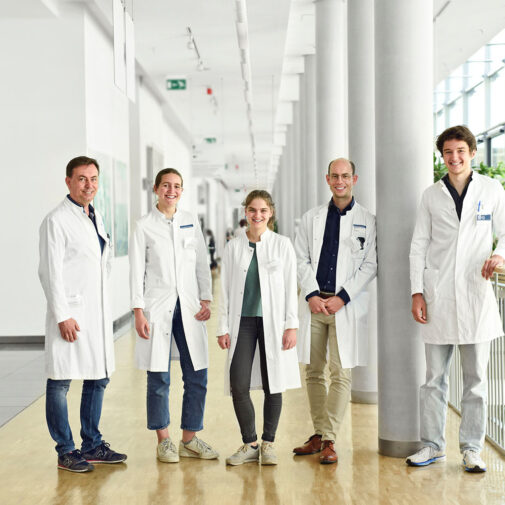
Level 1: Junior Clinician Scientists for Rare (JCS4RARE)
Laying the groundwork in due time: The Junior Clinician Scientist for Rare Program (JCS4RARE) offers a two-year structured training program for young, research-active physicians who already show a serious interest in the research field of rare diseases during their doctorate or in the first three years of their specialist training. These promising talents are to be encouraged in their interest at an early point in their career, networked with other researchers and given focused, ongoing training. The aim is to familiarize young scientists with relevant structures, topics and methods at an early stage and to promote long-term integration both within the rare disease community and with other medical and scientific fields.
FINANCING
To support a Junior Clinician Scientist, Alliance4Rare funding partners finance 25% of the regular staff position, which is thus available for scientific tasks and further training. The real full costs for this position currently amount to approx. 22,500 euros per fellowship per year. Ideally, funding partners will also pay a lump sum of 2,500 euros per year to cover the costs of further training and networking opportunities (e.g. travel and accommodation costs for job shadowing and winter schools). As Junior Clinician Scientists are each funded for two years, the costs therefore add up to 45,000 – 50,000 euros per fellowship.
Our Junior Clinician Scientists for Rare (JCS4RARE) – Level 1
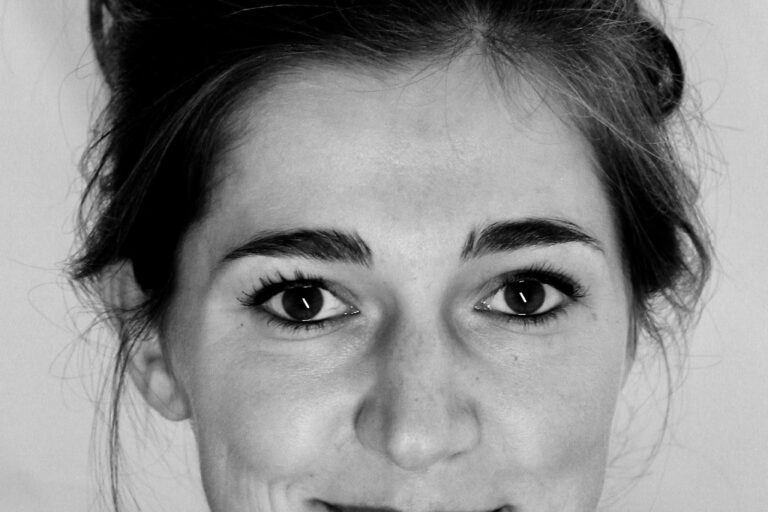
Dr. med. Nina-Maria Wilpert, JCS4RARE
Charité – University of Medicine, Berlin
Funding period: January 2024 to December 2025
Dr. Nina-Maria Wilpert studied human medicine at Charité and has already worked on the molecular and phenotypic characterization of MCT8 deficiency and FOXG1 syndrome, two ultra-rare monogenic developmental disorders of the nervous system, during her dissertation. She is currently working as an assistant physician at the Department of Pediatrics with a focus on neurology at the Charité Campus Virchow-Klinikum (CVK). In January 2024, she was accepted into the Junior Clinician Scientist for Rare Program (JCS4RARE) through the joint funding of the Eva Luise and Horst Köhler Foundation and the Berliner Sparkassenstiftung Medizin. As part of this program, she is researching a therapeutic approach for Allan-Herndon-Dudley syndrome (AHDS) at the Center for Experimental Pediatric Endocrinology.
AHDS is an ultra-rare disease that is caused by defective thyroid hormone transport and only affects boys. Children with AHDS have difficulty holding their heads up and are muscularly very hypotonic. Mental and motor development is severely delayed and health complications can cause premature death. Dr. Wilpert has found promising results for dopamine supplementation in AHDS patients and would like to further investigate the connection between thyroid hormone and dopamine metabolism as part of the JCS4Rare program. Her aim is to identify target cells and a time window for effective therapies.
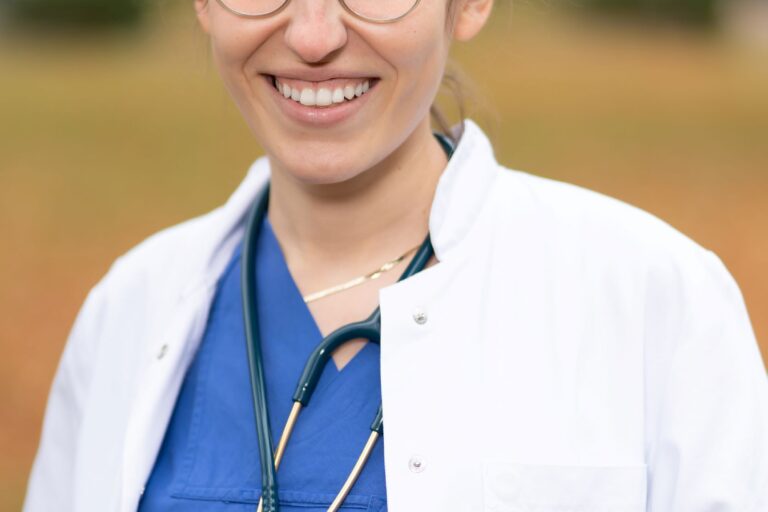
Dr. med. Ruth Maria Urbantat, JCS4RARE
Charité – University of Medicine, Berlin
Funding period: January 2024 to December 2025
Dr. Ruth Maria Urbantat received her doctorate from Charité – Universitätsmedizin in 2022, where she is now an assistant physician at the Department of Pediatrics with a focus on pneumology, immunology and intensive care medicine. In January 2024, she was accepted into the Junior Clinician Scientist for Rare Program (JCS4RARE) through the joint funding of the Eva Luise and Horst Köhler Foundation and the Berliner Sparkassenstiftung Medizin. As part of the program, Dr. Urbantat is working on primary ciliary dyskinesia (PCD). PCD is a rare multi-system disorder that often leads to severe pulmonary problems in young adulthood.
Dr. Urbantat plans to use a biobank of airway epithelial cell cultures she has established to functionally characterize underlying mutations. Using innovative biochemical and functional methods, she wants to investigate gender-specific differences in cilia function and develop new therapeutic approaches for PCD.

Level 2: Clinician Scientist for Rare (CS4RARE)
The second stage of our training and career path promises intensive research work and further training: it is aimed at doctors who have already completed a significant part of their specialist training in the field of pediatrics or pediatric-oriented human genetics (at least three years) and have demonstrated very good scientific performance and a profound interest in SE during this time. The extended leave of absence from clinical activities (50%) allows CS4Rare to work intensively on their own research projects. In doing so, they are encouraged to work on highly relevant questions that cannot be asked in animal models, for example. Within three years, the CS4Rare will expand their network, deepen their scientific skills and acquire key qualifications in order to be ready for habilitation at the end of the three-year funding period.
FINANCING
The funding of a Clinician Scientist for Rare (CS4Rare) comprises 50% of the regular staff position, so that this time is available for mandatory research and further training. The actual full costs for this proportion of the post per fellowship currently amounts to approx. 50,000 – 60,000 euros per year. As clinician scientists are generally funded for three years, the costs for the Alliance4Rare funding partners therefore add up to around 155,000 – 165,000 euros per fellowship.
Our Clinician Scientists for Rare (CS4RARE) – Level 2
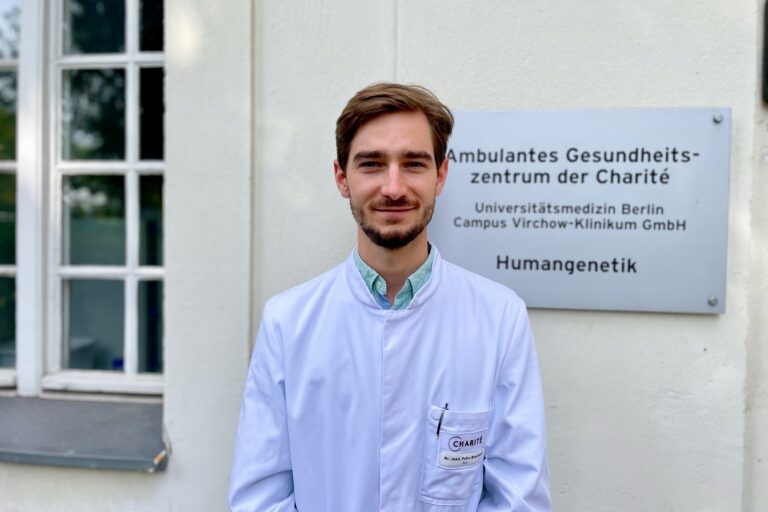
Dr. med. Felix Boschann, CS4RARE
Charité – University of Medicine, Berlin
Funding period: July 2022 to June 2025
Dr. Boschann studied medicine at Charité Universitätsmedizin Berlin and is currently undergoing specialist training as a human geneticist at the Institute of Medical Genetics and Human Genetics. As part of the Clinician Scientist for Rare Program, Dr. Boschann is researching “Genome sequencing in hereditary connective tissue diseases”. A special focus is on syndromic and familial aortic diseases. He is currently compiling a cohort of cases that have not yet received a molecular diagnosis, even though they developed an enlargement or dissection of the aorta at a comparatively early stage. These patients are being offered a genome and transcriptome analysis. The aim is to find new mutations in known genes that have not yet been detected by conventional diagnostics and to detect new disease genes. In the best-case scenario, this will end the diagnostic odyssey for many sufferers. At the same time, the molecular results have been shown to have a major impact on individual patient management and risk assessment within the family. In addition to this translational benefit, basic scientific findings on the molecular mechanisms of the development of aortic aneurysms should also be found.
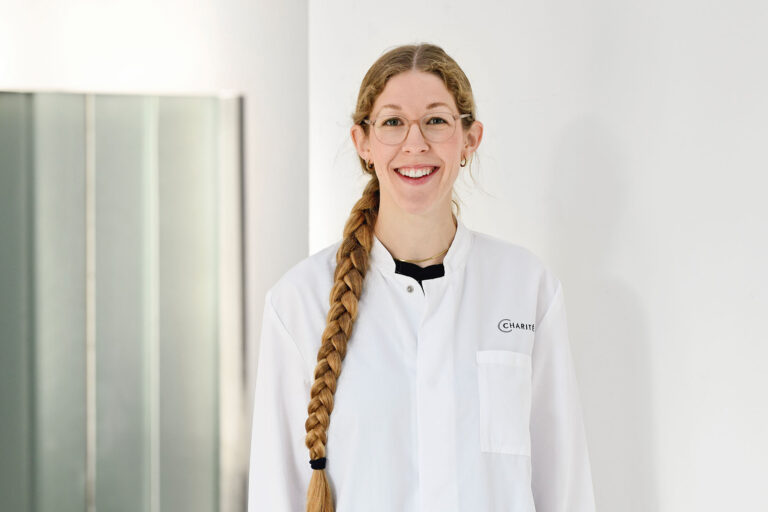
Dr. Leonie Schumm, CS4RARE
Charité – University of Medicine, Berlin
Funding period: July 2023 to June 2026
Dr. Schumm studied human medicine at Humboldt-Universität in Berlin and completed her doctorate at the Department of Neurosurgery at Charité – Universitätsmedizin Berlin. She continued her training as a specialist in pediatric and adolescent medicine at Charité after working at the University Hospital Carl Gustav Carus Dresden and the University Children’s Hospital Zurich. Here, as a clinician scientist at the Department of Pediatrics with a focus on gastroenterology, nephrology and metabolic medicine, she is researching an immunomodulatory therapeutic approach for biliary atresia, a rare early childhood disease of the liver that affects around one in 12,000 newborns in Germany. Children with biliary atresia cannot drain bile from the liver because their bile ducts are atrophied. Unless the obstruction of the bile duct is corrected palliatively or the liver is transplanted, the disease leads to cholestasis, fibrosis and death within 24 months. Studies have shown that chronic inflammatory processes play a decisive role in the development of biliary atresia. In the mouse model, repurposing a clinically used antibody against autoimmune cells cured the disease. Hopes for immunomodulation in human biliary atresia are therefore high.
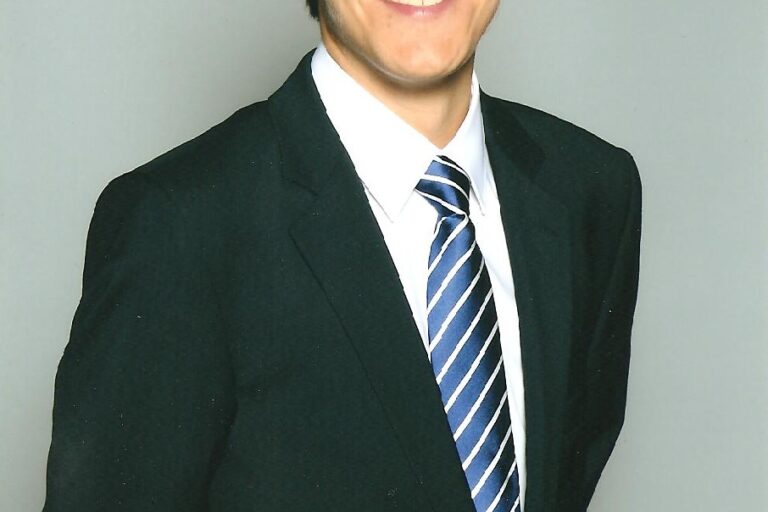
Dr. med. Steffen Köhne, CS4RARE
University Medical Center, Göttingen
Funding period: September 2023 to December 2026
Dr. Köhne studied human medicine at the Georg-August-University (Göttingen) and received his doctorate at the Clinic for Cardiology and Pneumology at the University Medical Center, Göttingen. He is expected to complete his specialist training at the Department of Pediatrics and Adolescent Medicine with a focus on neuropaediatrics/pediatric gastroenterology in September 2024. His scientific focus is on NEDAMSS, a very rare form of pediatric dementia. The phenotypic spectrum of patients ranges from developmental delays to the most severe neurodegenerative courses, in which the affected children and adolescents ultimately lose all the skills they have ever learned. In his cross-site and consistently translational approach, Dr. Köhne combines his clinical research to investigate the natural course of the disease with the innovative basic scientific methods of his project partners at the Max Delbrück Centrum Berlin. To identify the underlying molecular and biochemical processes, organoids from patient cells are being developed there, which will ultimately be used for comprehensive drug screening to identify the first drug candidates for the treatment of NEDAMSS.
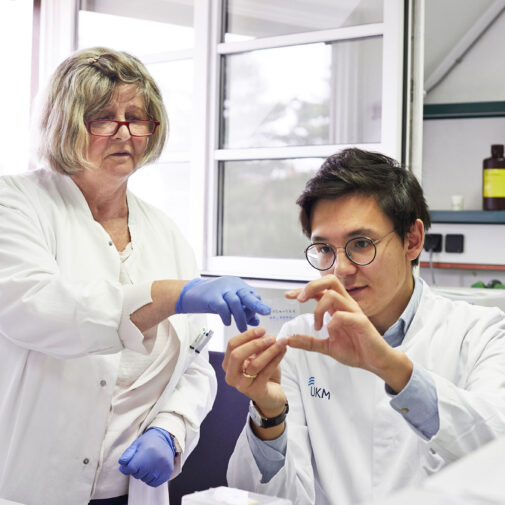
Level 3: Advanced Clinician Scientist for Rare (ACS4RARE)
Passing on knowledge and helping to shape it: The third career stage is aimed at specialists in pediatrics and human genetics (possibly in specialist or additional training) as well as senior physicians who have already successfully embarked on the academic career path and have proven expertise in a rare disease or disease group. It ensures a contractually defined research share of 50% of working hours and thus offers a binding framework in which the ACS4Rare can establish an independent working group and actively shape the research area of rare diseases at their location. Through research-oriented teaching and active mentoring, the ACS4Rare pass on their experience to the next generation of scientists and encourage young talents to follow the challenging but rewarding path of a Clinician Scientist for Rare.
FINANCING
In the case of funding for an Advanced Clinician Scientist for Rare (ACS4Rare), Alliance4Rare funding partners finance 50% of the regular position, which is thus available for scientific tasks and further training. Depending on the individual career stage of the fellow, the actual full costs for this part of the position currently amount to around 55 – 70,000 euros per year. As ACS4Rare are generally funded for three years, experience has shown that the costs add up to around 170,000 – 200,000 euros per fellowship.
Our Advanced Clinician Scientists for Rare (ACS4RARE) – Level 3
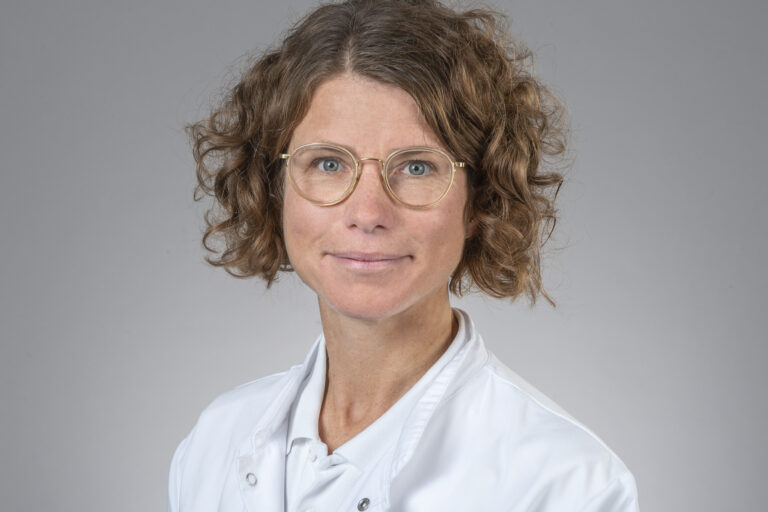
Dr. med. Nina-Christine Knopf, CS4RARE
University Hospital Carl Gustav Carus, Dresden
Funding period: August 2022 to July 2023
Dr. Knopf studied human medicine at the University of Hamburg and the Friedrich Wilhelm University of Bonn. She completed her training as a specialist in pediatric and adolescent medicine and as a pediatric rheumatologist in Cologne. Dr. Knopf conducts research into autoinflammatory diseases and is looking for new biomarkers in order to be able to predict disease relapses and to enable better therapy management. Among other things, she is working with colleagues from Würzburg and Luxembourg to analyze gene expression in children with SURF (systemic undefined recurrent fever or systemic recurrent fever syndrome of unknown origin). The Alliance4Rare gives her the opportunity to devote sufficient time to complex clinical pictures in addition to her specialist work in the special consultation hours or in her campus-wide consultation work in order to speed up the diagnosis of rare diseases.
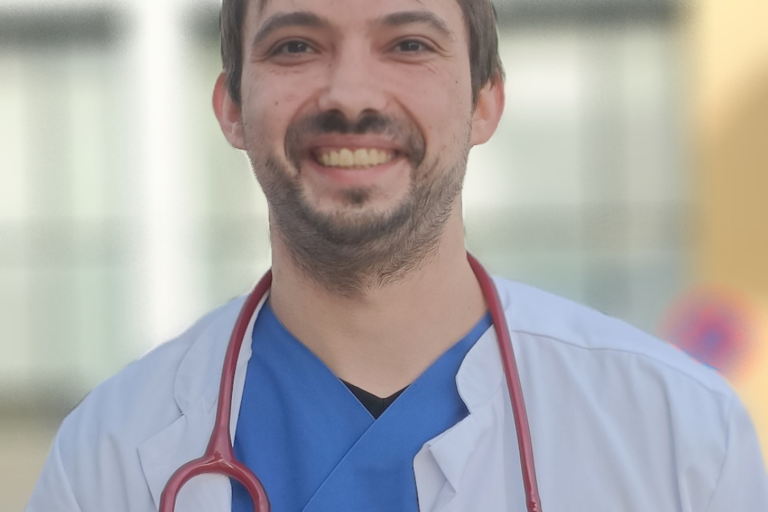
Dr. med. Simon Badura, CS4RARE
University Medical Center, Göttingen
Funding period: January 2023 to December 2025
Dr. Badura studied human medicine at the Georg-August-Universität in Göttingen. He completed his training as a specialist in pediatrics and adolescent medicine there in 2023 and is currently undergoing specialist training in neuropaediatrics. As an Advanced Clinician Scientist at Alliance4Rare, he is working scientifically on a group of rare neurological diseases caused by mutations in the ATP1A3 gene. These include alternating hemiplegia of childhood (AHC), rapid-onset dystonia-Parkinson’s syndrome and CAPOS syndrome. To date, there are no causal therapies for any of these diseases, and patients suffer from a variety of painful symptoms and have to endure repeated stressful diagnostic procedures. The aim of the research project is to use state-of-the-art 3D cell culture models (bioengineered neuronal organoids (BENOs) from human stem cells to identify the underlying pathophysiology of each disease entity and to develop therapeutic options for the patients affected.
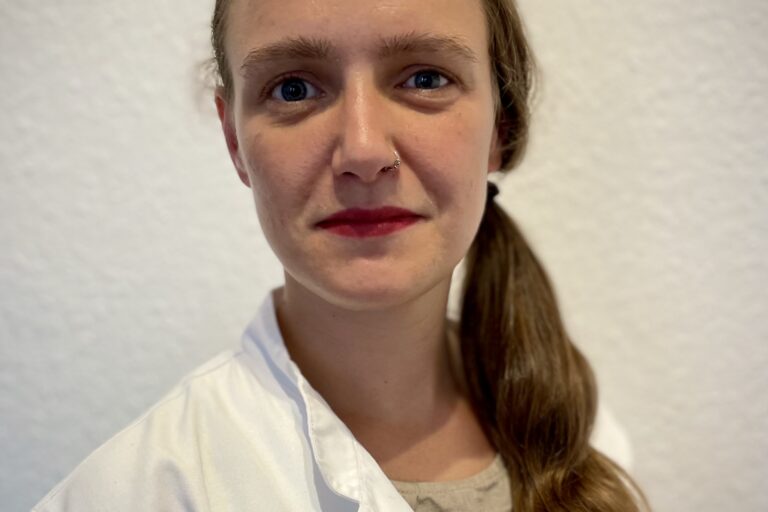
Dr. med. Julia Körholz, CS4RARE
University Hospital Carl Gustav Carus, Dresden
Funding period: April 2024 to December 2026
Dr. Julia Körholz first studied human medicine at the Albert-Ludwigs-University in Freiburg and then at the Technical University of Dresden, where she received her doctorate in 2018. Dr. Körholz has been working clinically and scientifically on congenital immunodeficiencies for many years. She was a fellow of the Else Kröner Research College for Rare Diseases, where she began working on SOCS1 haploinsufficiency, a relatively new monogenetic immunodeficiency. She is now able to continue this research thanks to funding from the Friede Springer Foundation. Immunodeficiencies are no longer just diseases with an increased susceptibility to infection; congenital diseases with autoimmunity and immune dysregulation can also be signs of a congenital disorder of the immune system. For example, patients with SOCS1 haploinsufficiency are characterized by overactivation of the immune system with symptoms similar to lupus. The aim of the research is to understand the signaling pathways dysregulated by the immunodeficiency and thus identify patients who have an increased risk of severe manifestations of the disease. The aim is to identify targeted therapeutic approaches that are able to slow down the excessive immune activation.
FAQs on the topic of promoting young talent
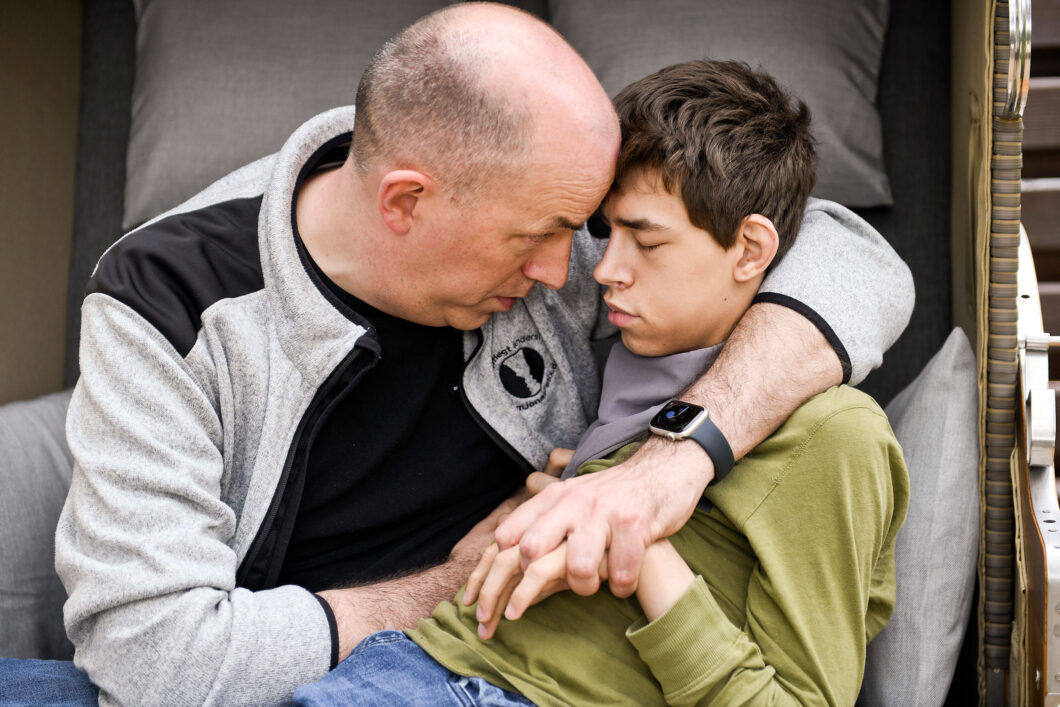
Support the orphans of medicine!
ELHKS uses your donations in a targeted manner – so that medical progress reaches everyone.
Our free newsletter informs you about current calls for proposals, events and projects concerning rare diseases.